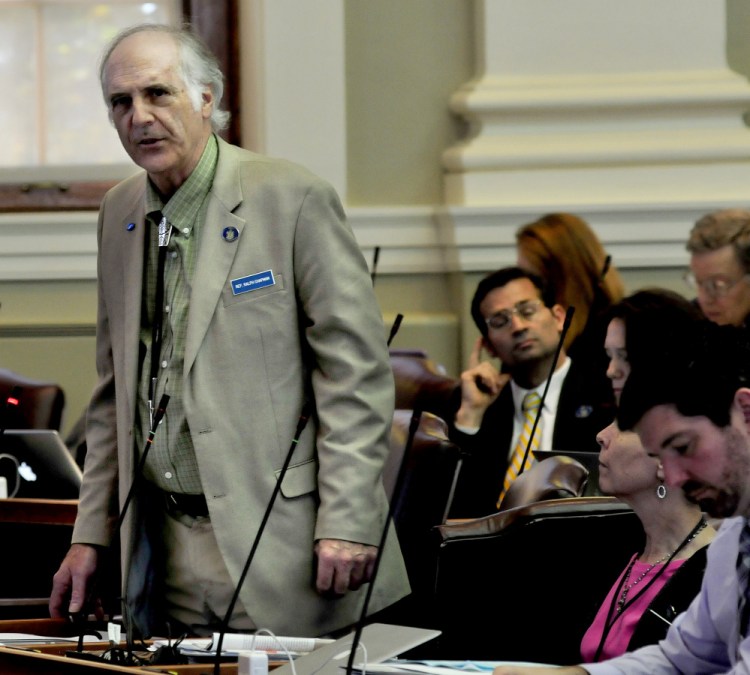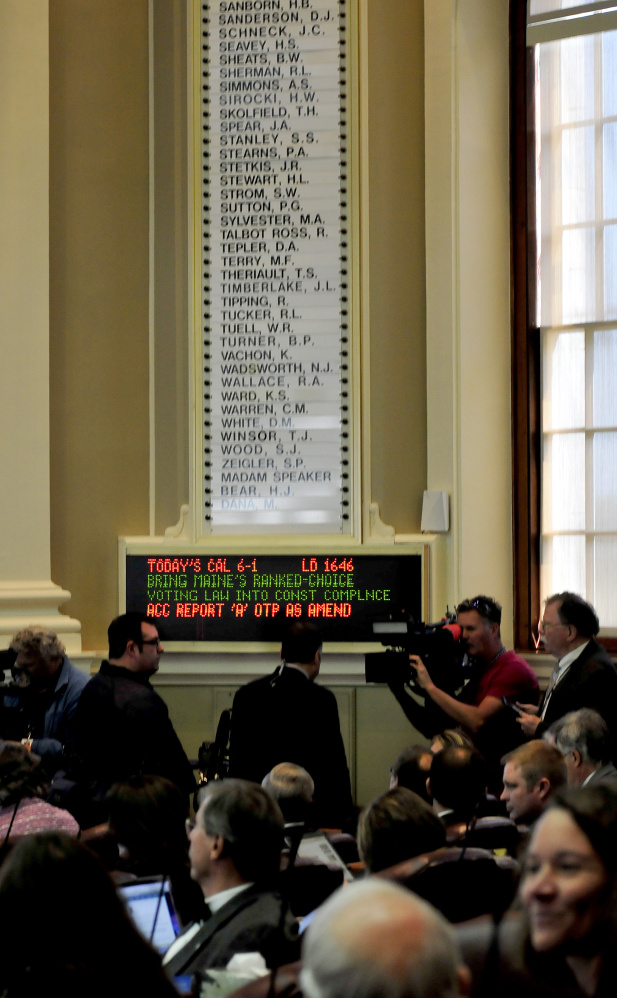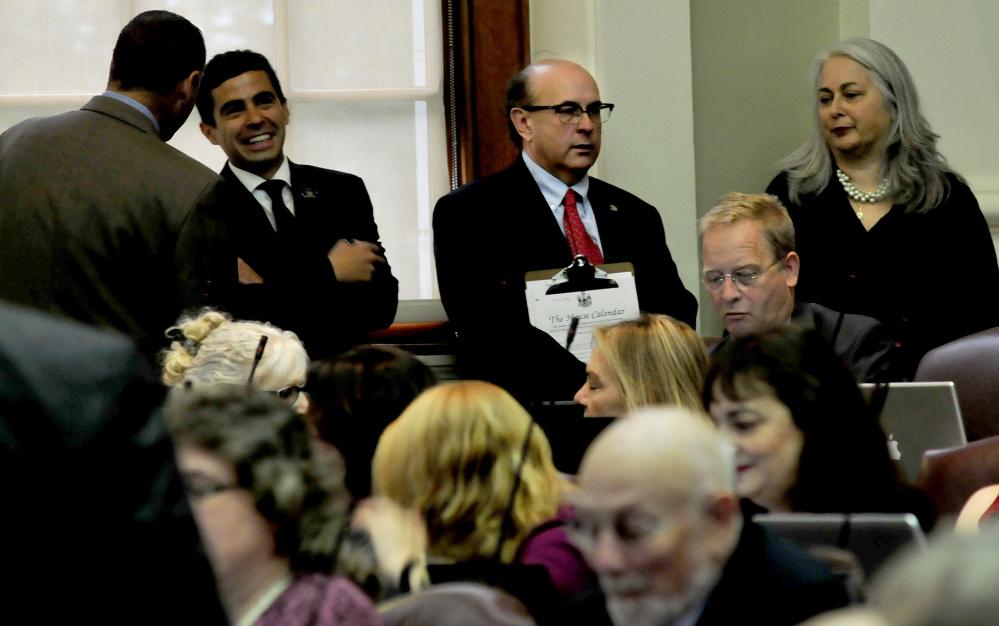AUGUSTA — A citizen-backed law that made Maine the first state to adopt a ranked-choice voting system will be delayed and possibly repealed following a series of contentious votes Monday in a special session of the Legislature.
The Senate voted 19-10 to delay the law until December 2021 – and then repeal it if a constitutional amendment hasn’t been passed by then to address legal concerns raised by the Maine Supreme Judicial Court. The House held six procedural votes, then finally agreed with the Senate on a 68-63 tally. The bill now will go to Republican Gov. Paul LePage.
LePage will have 10 days to sign it, veto it or allow it to become law without his signature. The Republican long has argued that ranked-choice is unconstitutional and he is unlikely to veto the delay.
Also Monday, the Legislature agreed to amend a new food sovereignty law that it passed and LePage signed into law this year. The new law prompted a federal threat to shut down state-inspected slaughterhouses, potentially jeopardizing the livelihoods of many farmers. The Senate quickly approved a fix to the law and the House approved it unanimously.
Leaders of the referendum campaign that got ranked-choice voting onto the November ballot vowed to push for a citizen-backed veto of the Legislature’s repeal if LePage signs it.
Kyle Bailey, a spokesman for the Committee on Ranked Choice Voting, said lawmakers thwarted the will of voters and suggested those who did might pay a price.
“People caved to undermine the will of the people, it’s a sad day for our democracy, it’s a sad day for the state of Maine,” Bailey said. “But we are not finished, we are not going to stop fighting. Maine people need a system that works. We are going to work every day to make sure we have that better system. If it requires changing the composition of the Maine Legislature and the people who are here so our elected representatives in this solemn building fulfill their obligation to the people, to uphold their will, instead of pandering to hyper-partisan special interests and extremes, then we will change the composition of the Maine Legislature.”
Bailey took aim at lawmakers in both parties, as well as Maine Secretary of State Matt Dunlap, a Democrat, who Bailey said was among those opposing ranked-choice.
Dunlap said he never took a position against the bill but provided information to lawmakers as they sought clarification on how the law could be implemented and what might happen in the event of a court challenge. Dunlap has previously told lawmakers he would implement the law, but that any system involving more than one ballot or different ways of voting in different races could be costly and confusing.
In May, the Maine Supreme Judicial Court issued a unanimous advisory opinion to the state Senate noting that parts of the law that applied to races for governor and the Legislature appeared unconstitutional. The court recommended either repealing the law or approving a constitutional amendment which would then go to voters. Two-thirds of the Legislature and a majority of Maine voters would have to approve a constitutional amendment.
Lawmakers were unwilling Monday to back another proposal to delay the law until 2019 to give Dunlap time to study how to implement it and estimate the cost of doing so. The Legislature also could not muster enough support to amend the constitution, which requires that candidates for governor and the Legislature be elected by a plurality – the highest vote total wins – rather than a majority.
Under the ranked-choice system, voters would rank candidates in order of preference. If no one had more than 50 percent of the vote after the first count, the candidate with the fewest votes would be eliminated. Voters who chose the eliminated candidate would have their ballots added to the totals of their second-ranked candidates, and the ballots would be retabulated. The process would continue until one candidate had a clear majority and was declared the winner.
Rep. Kent Ackley, an independent from Monmouth, reminded House members Monday that state voters had endorsed ranked-choice voting through a constitutional process that lawmakers were sworn to uphold.
“If we let the fear of change result in a delay or an override of the method that the voters of Maine told us to use, we will be undermining the voters’ faith and their faith in the power of their votes, their faith in self-governance and we will be stoking the flames of fear and cynicism that might take our state to a darker place,” he said.
But Sen. Bill Diamond, a Windham Democrat who served as Maine’s secretary of state, warned against dropping “this mother of all nightmares” on local election clerks and town officials. Diamond said recount processes already are complicated and time-consuming even without the complexities of ranked-choice. He supported delaying implementation until at least 2021.
“We tried to amend the state constitution and it didn’t even come close,” Diamond said in reference to a constitutional amendment proposal that failed during this year’s legislative session. “It would be clearly irresponsible to leave something on the books that we know is going to be unconstitutional.”
But other Democrats, including those who didn’t advocate for ranked-choice, said they were more than frustrated over the Legislature’s inability to follow the voters’ guidance.
“I’m flabbergasted, frankly,” said state Rep. Charlotte Warren, D-Hallowell. She noted that of the four referendum initiatives passed by voters in November, the Legislature had amended or repealed three, including laws on the minimum wage, voting and a tax surcharge on household incomes over $200,000 that would have been earmarked for education.
“What I have heard from constituents, what it feels like to them is that over and over and over we don’t honor their will,” Warren said. “And we did that again today by this vote.”
But other lawmakers said the Legislature has the responsibility to write, amend and repeal laws, and that while the ranked-choice voting received a majority vote statewide, not every Legislative district voted for it. Legislators from those districts said they were following the will of their constituents.
“This is our job and our responsibility as well,” said Rep. Jeff Timberlake, R-Turner.
Others said lawmakers heard hours of testimony in support of ranked choice and little opposition. Rep. Craig Hickman, D-Winthrop, said the Legislature shouldn’t be surprised if voters are now angry.
“The people told us ‘Do not delay and do not repeal’ and we just delayed with a possible repeal and they wonder why the people want to spit in our faces when they come in to see us,” Hickman said.
The Senate also confirmed several LePage appointments Monday, including for two members of his Cabinet. The Senate confirmed the appointment of Ricker Hamilton as the commissioner of the Department of Health and Human Services. Hamilton replaces Mary Mayhew, who resigned to seek the Republican Party’s nomination for governor in 2018. The Senate also confirmed Alex Porteous as commissioner of the Department of Administration and Financial Services.
The Senate also confirmed five superior and district court judges.
A photo caption on this story was corrected at 6 p.m. Oct. 24 to indicate that Rep. Ralph Chapman is a Green Independent.
Staff Writer Kevin Miller contributed to this report.
Scott Thistle can be contacted at 713-6720 or at:
sthistle@pressherald.com
Twitter: thisdog
Copy the Story LinkSend questions/comments to the editors.






Success. Please wait for the page to reload. If the page does not reload within 5 seconds, please refresh the page.
Enter your email and password to access comments.
Hi, to comment on stories you must . This profile is in addition to your subscription and website login.
Already have a commenting profile? .
Invalid username/password.
Please check your email to confirm and complete your registration.
Only subscribers are eligible to post comments. Please subscribe or login first for digital access. Here’s why.
Use the form below to reset your password. When you've submitted your account email, we will send an email with a reset code.